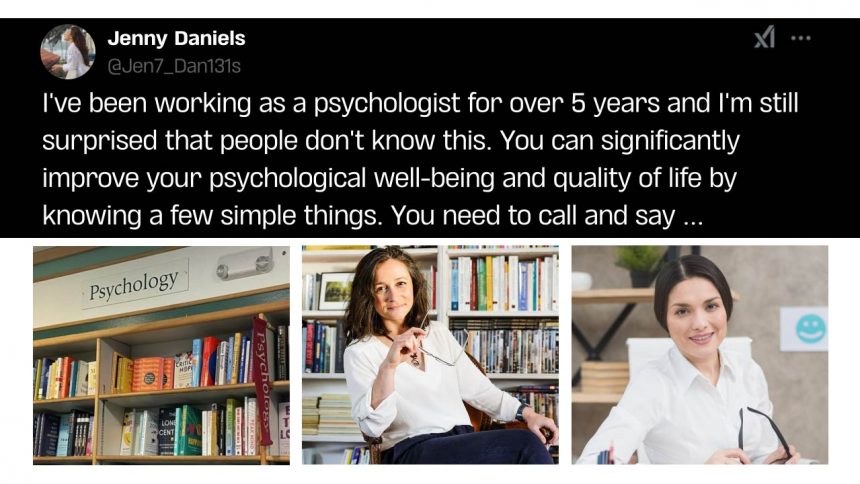As a psychologist with more than five years of professional experience, I’ve come to realize that many people still don’t fully understand how to optimize their mental and emotional well-being. It’s common to think that psychological health is a complex issue, requiring extensive therapy or deep introspection, but in reality, there are a few simple, yet powerful strategies that can significantly improve your psychological well-being and overall quality of life.
Surprisingly, many individuals—despite their struggles with stress, anxiety, or depression—don’t know that they have the ability to dramatically improve their mental health by taking simple actions. From recognizing your needs to proactively reaching out for help, these foundational steps can make a significant difference in the way you experience daily life. Understanding and practicing these principles can empower you to take charge of your mental health and enjoy a better, more fulfilling life.
In this article, I’ll share five things I believe everyone should know, based on my experience working as a psychologist. These insights are not just for those who are struggling with a mental health diagnosis—they’re for anyone who wants to improve their psychological well-being.
1. Reach Out for Help When You Need It—Don’t Wait Too Long
One of the most important things I’ve learned over the years is that many people hesitate to ask for help when they’re struggling emotionally or psychologically. Society often places a stigma on seeking mental health support, and some people may feel ashamed or afraid to talk about their issues, even with loved ones. This reluctance can prevent people from accessing the help they need, delaying the healing process and allowing their struggles to worsen.
If you are feeling overwhelmed by stress, anxiety, sadness, or any other emotional difficulty, it’s crucial to reach out. Don’t wait until the problem becomes unbearable. Call a therapist, speak to a counselor, or even talk to a trusted friend or family member. The earlier you address your struggles, the easier it will be to manage them before they turn into more severe issues.
When I say “reach out,” I don’t mean just to mental health professionals, but also to the people around you. Sometimes, just opening up to a friend or family member about what you’re going through can create a huge sense of relief. Expressing your feelings and knowing that someone is there to listen can help you feel supported and less isolated.
2. Your Mental Health Is Just As Important As Your Physical Health
For many people, mental health still seems like something less important than physical health. We often prioritize physical ailments like back pain or a headache, yet we overlook the emotional toll that stress, anxiety, and negative thought patterns can have on our well-being. People don’t often give themselves permission to rest mentally or care for their emotions in the same way they would rest a sore muscle.
It’s crucial to acknowledge that your mental health deserves the same attention and care as your physical health. When you’re feeling run down emotionally, it’s important to recognize it and take steps to heal. Whether that means taking a break, practicing relaxation techniques, engaging in mindfulness exercises, or simply giving yourself permission to relax, addressing your mental health is an essential part of maintaining a well-rounded, healthy life.
There’s a powerful connection between the mind and body, and neglecting one aspect of your well-being can lead to negative consequences for the other. For example, unresolved stress or anxiety can manifest physically, leading to fatigue, headaches, or even gastrointestinal problems. Likewise, chronic physical illness can trigger or worsen mental health struggles. The key is to take a holistic approach to your well-being, addressing both the physical and psychological aspects of your health.
3. You Don’t Have to “Fix” Everything at Once—Take Small Steps
Another thing I’ve observed over the years is that many people expect instant results when it comes to improving their mental health. While it’s great to be motivated and ready to make changes, expecting to completely “fix” everything in one go can set you up for disappointment and frustration.
Progress in mental health is often slow and incremental, and that’s perfectly okay. In fact, small, consistent steps toward improvement are far more sustainable than trying to make dramatic changes all at once. If you’re dealing with negative thought patterns, stress, or emotional pain, consider taking baby steps toward healing. It could be something as simple as taking five minutes a day to practice deep breathing or setting aside time to engage in an activity you enjoy.
One helpful tip is to break your larger goals into smaller, manageable actions. Instead of saying, “I need to be less anxious,” you could focus on specific strategies like “I’ll try a relaxation technique before bed tonight” or “I’ll talk to a friend about how I’m feeling this week.” By focusing on manageable tasks, you build momentum and develop healthy habits that will improve your psychological well-being over time.
4. The Power of Self-Compassion: Be Kind to Yourself
Many people are their own worst critics. We often have an inner dialogue that is filled with self-judgment, self-doubt, and harsh criticism. Whether it’s berating ourselves for making mistakes or thinking we should be “better” or “stronger” in difficult situations, we tend to be far less compassionate with ourselves than we are with others.
The truth is, no one is perfect, and everyone makes mistakes. Practicing self-compassion is a game-changer when it comes to mental health. Rather than focusing on your perceived shortcomings, try to be gentle with yourself. Acknowledge that you’re doing the best you can, and give yourself credit for the efforts you’re making. If you slip up, be kind to yourself instead of getting discouraged.
Self-compassion doesn’t mean letting yourself off the hook for mistakes or avoiding growth—it simply means treating yourself with the same care and understanding that you would offer to a close friend who is struggling. This mindset shift can reduce self-criticism and increase emotional resilience, helping you navigate life’s challenges with greater ease.
5. Emotional Awareness and Expression Are Key
Emotional awareness is something that most people overlook, yet it plays a crucial role in psychological well-being. Being able to recognize and identify your emotions is the first step in managing them effectively. Many people have difficulty naming their feelings, which makes it harder to understand what’s truly going on inside. This often leads to avoidance behaviors, such as burying emotions or turning to unhealthy coping mechanisms like excessive drinking, overeating, or withdrawing from others.
Learning how to recognize and express your emotions in a healthy way can be incredibly liberating. It’s essential to give yourself permission to feel, without judgment. You might experience anger, sadness, frustration, or even joy—but the key is to accept those feelings as part of the human experience. Journaling, talking to a therapist, or having open conversations with friends or family are all effective ways to process and express your emotions in a constructive manner.
By developing emotional awareness and finding healthy outlets for expression, you can prevent emotional buildup and increase your sense of well-being. Bottling up emotions or ignoring them can have long-term negative effects on your mental health.
Conclusion: Take Control of Your Mental Health Today
As a psychologist, I’ve witnessed countless individuals experience profound changes in their mental health simply by learning and implementing a few simple principles. While it’s normal to face mental health challenges from time to time, it’s also important to recognize that you have the power to improve your psychological well-being.
By reaching out for help when needed, prioritizing your mental health, taking small steps toward improvement, practicing self-compassion, and embracing emotional awareness, you can begin to build a more resilient, balanced, and fulfilling life. These strategies may seem simple, but they can have a profound impact on your overall quality of life.
If you’ve been struggling with your mental health, don’t wait any longer. Take a step today to prioritize your well-being—whether that’s reaching out for support, starting a new self-care habit, or simply being kind to yourself. Your psychological health is just as important as your physical health, and you have the power to take control and improve your life, one small step at a time.





